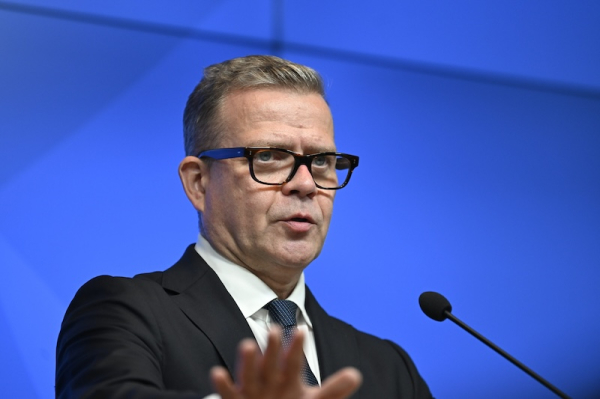Orpo halts budget talks as racism row delays negotiations

Prime Minister Petteri Orpo available to the media before the start of the budget session in the Government Banquet Hall’s press room in Helsinki on 1 September 2025. Photo:
- Next Article Two players win €7.95 million Lotto jackpots in Helsinki and Karjaa
Finland’s government has delayed the start of formal budget negotiations after a row erupted over remarks made by senior members of the Finns Party. Prime Minister Petteri Orpo appeared alone at the opening press conference, stating that no fiscal agreements would be reached before coalition leaders addressed issues of language and conduct within the government.
The unusual move signalled a deepening divide inside the four-party coalition, which gathered in Helsinki’s Smolna state residence to negotiate €1 billion in additional budget cuts. Instead, discussions stalled as Orpo demanded clarity from his partners over recent public statements by Finns Party officials referring to immigrants as “low-quality arrivals”.
“The classification or evaluation of people based on country of origin, socioeconomic background or education is inhumane. It must be addressed,” Orpo said.
The row stems from a televised appearance by Finns Party vice-chair Teemu Keskisarja, in which he repeated claims linked to the so-called population replacement theory. His language was widely condemned, but was later endorsed by the party’s chair and Finance Minister Riikka Purra, who said she found nothing inappropriate in the comments.
The dispute forced a delay in the government’s annual “budget lock-in,” a process in which all ministers agree on next year’s revenue and spending plans. While talks were expected to start on Monday morning, coalition leaders instead began closed-door discussions on internal conduct and political boundaries.
Opposition leaders from the Social Democrats, Greens and Left Alliance criticised the coalition for what they called repeated tolerance of extremist language. Antti Lindtman, leader of the SDP, said on X that Purra’s endorsement of Keskisarja’s words gave “a home to racism and hatred of people” inside the government.
“Will Prime Minister Orpo continue to guarantee this political line as head of government?” Lindtman asked.
Sofia Virta, leader of the Greens, urged Orpo to dissolve the coalition if the issue could not be resolved. “Orpo must make it clear that policy based on this ideology will not be pursued in Finland, not now and not in future,” she said.
Despite Orpo’s insistence on drawing a line, he did not commit to issuing a new anti-racism declaration, such as the one signed in 2023 following similar controversies involving Purra’s past online writings. At that time, the government narrowly avoided collapse.
The current standoff also comes amid widespread protests outside Smolna. Demonstrators representing over 140 organisations gathered to oppose proposed budget cuts to social services and health NGOs. They included pensioners, disability advocates, mental health organisations and housing support groups.
Some protestors arrived from other regions of Finland. Representatives from Satakunta’s Sininauhasäätiö said that existing cuts had already forced the closure of a key support centre for vulnerable people in Pori. “This is not how to save money. Exclusion comes at a cost,” said development officer Iida Makkonen.
Inside the negotiation venue, tensions were evident. Foreign Minister Elina Valtonen was seen entering Smolna only to leave shortly after, declining to comment. Christian Democrat minister Mika Poutala spoke briefly with protestors but refused to comment on the internal dispute. Centre-right MP Ville Valkonen, who led a preparatory working group on budget issues, also avoided direct statements but expressed hope that “the government focuses on issues that matter to Finns”.
While the budget details have not been finalised, several items are already on the table. The proposed €1 billion in cuts will come on top of €9 billion in previous adjustments. Major changes expected include reductions in housing construction support, with state-backed ARA loan guarantees to be cut by €350 million. This change is expected to improve public debt figures without delivering direct expenditure cuts.
Other savings include partial reversals of increased Kela reimbursements for private doctor visits. Though the reimbursements were recently raised to €30 per visit, their impact on healthcare queues has been limited. The government is now considering reclaiming a portion of the €355 million allocated for this purpose.
Further reductions are planned for integration payments to municipalities and development cooperation funding. Plans to cut local government grants by €150 million, initially suggested by Purra, have been dropped. Also rejected were proposals to close the Finnish National Agency for Education and halt refugee resettlement quotas.
The government is also considering increasing excise taxes on alcohol and tobacco, and is reviewing the extent of tax relief for high-income pensioners. Meanwhile, business subsidies are under scrutiny, with a shift likely from direct grants to changes in tax support.
As of late Monday afternoon, no formal budget session had begun. Instead, the four coalition party leaders, Orpo, Purra, Sari Essayah of the Christian Democrats, and Anders Adlercreutz of the Swedish People’s Party, were still engaged in confidential talks aimed at restoring internal trust.
Source: www.helsinkitimes.fi
